5th EDITION- CWID’S NEWLETTER
September 2011
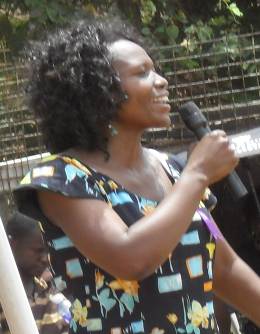
Welcome to this month’s edition of CWID’s newsletter, on behalf of all the CWID staff, we want to thank you for viewing our website. CWID is still on the move to advocate for the rights of women and children at the Coastal region and we thank God because we see the impact on the ground. We appreciate any feedback from you sent to cwid@coastwomen.org. Welcome.
Programs Director, Ms. Betty Sharon.
In this edition we look at;
-
. Girl child education
-
. International Day of Action on Women’s Health
-
. Women and Leadership
-
. Reproductive health at the Coast
-
. Male behavoral change on GBV cases
-
. Environment concious
-
. World ocean day
-
. Prevention of early marriages amongst school-going children
-
. Success story
Girl Child Education
The organization has interests of the girl-child at heart especially those living and learning at the grassroots level. Most of these girls do not have the priviledge to have opportunities like their peers just because their families cannot afford to. Such matters extend to affording of sanitary towels, -a very necessary tool to a girl who is menstruating and many girls face this stage when they are aged between 9 and 18 years.
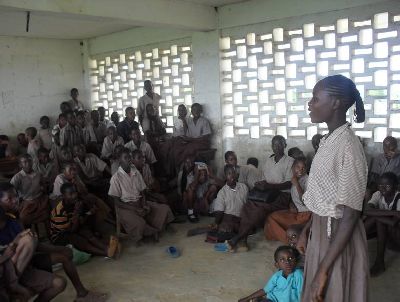
The organization gave sanitary towels to the pupils of Frere Town Primary School. The school that has a population of over a thousand pupils and most of them are from the poor families. These sanitary
towels come in as a basic need to young girls going to school. Girls should not be hindered from performing well because of lack of sanitary towels which makes them leave school prematurely, but rather they must have a common play field with their boys counterparts.
International Day of Action on Women’s Health
The International Day of Action on Women’s Health is a day that is usually marked on 28th May every year. This year’s localized theme was to advocate for increased funding to the health sector in the country in order to improve on reproductive health. The government is setting out very minimal funding into HSSF and the contribution from CDF is insignificant too.
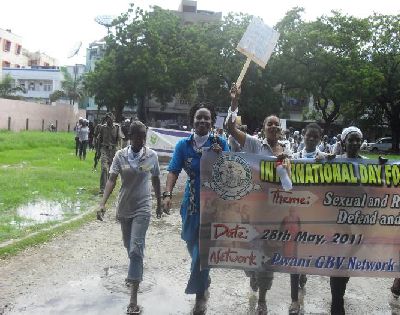
Mombasa residents in a procession in the International Day of Action on Women’s Health
The day was marked to remind the government and its citizens that there is need to come together as a group and increase funding into health sector in order to reduce infant and maternal mortality rate. (Full report for the event can be found on the Events page on the website.)
Women And Leadership
Coast Women In Development has participated in various leadership projects including empowerment trainings and forums both at the local and community level.These were organized to empower women to take leadership positions and to enable them participate in decision making processes, CWID was among the forerunners. Facilitators were invited to clarify on the devolved government and women leadership opportunities and spaces available.
One of the forums was Caucus for women in leadership regional assembly launch held at Bandari College, of which CWID is an affiliate member.It was started to empower women with information, get them in decision making positions and remove stereotyping of women in leadership, ensure accountability by their leaders, empower the youth, fight drugs and youth empowerment.The launch brought together various women in leadership positions both in government and local institutions, other than launching the programme the women were also enlightened on the opportunity and spaces available in the devolved government and gains for women in the new constitution of Kenya.
Reproductive Health At The Coast Province
The Healthy Action group of which CWID is a member held public forums both in Kilifi and Mombasa. The main objective was to create awareness to the society of the reproductive health state presently. The country loses 26 women daily due to reproductive health issues and this is because of poor health services, inadequate health centres and medical personnel.
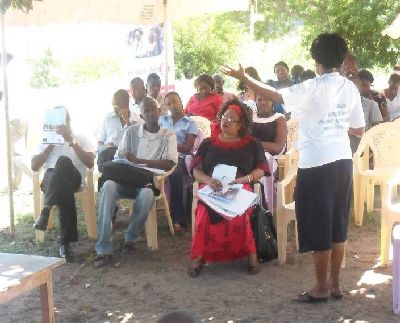
District Reproductive Health Coordinator- Mombasa
Ms. Victoria Kapuna sharing out the reproductive health
Status of the province to Kisauni residents
The state of our health centres is wanting because funds that are directed to the health sector are very minimal. Citizens are now sensitized to prioritize health especially reproductive health in CDF (community development fund) and to also influence the increase in Health Security Service Fund (HSSF).
There are many women dying due to complicatons faced after gender based violence (GBV) like long distance to the nearest health centre or dispensary, long queues before attaining services at the centres, few medical officers, expensive medication and recess systems. This is because they are not able to reach the nearest health centre in time and if they do, they have to take long waiting at the queue for the medical officers who are few or the needed machinery is not available. This is a major challenge that Kenyans are facing right now.
Male Behavoral Change On GBV Cases
Gender based violence (GBV) is a vice that is taking toll in family destruction and societal suicide. There are many issues that have come up but the major one that is untapped is tracking down the behavoral change of former male perpetrators especially those undergoing correction by law.
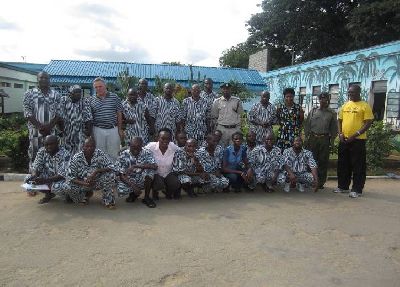
The male perpetrators will be counseled by Pwani GBV network counselors in order to track down their bahaviour like change of attitude. The Pwani GBV network together with a visiting researcher Dr. Chris Laming from University of Monash-Australia started a group with the inmates in Shimo la Tewa Main and Borstal Institution
Pwani GBV members with the Badilika Group
of Shimo la Tewa Main Prison.
called ‘Badilika Group’. The formation of the group is a project aimed at assisting these former offenders in changing their behaviour totally while in prison and even afterwards. The former male perpetrators will seek further support from the Pwani GBV network members too.
Environmental Issues
The organization has been in the forefront to fight poverty amongst women living in the rural areas. The involvement of Matano Manne and Mnarani women groups has shed light to these women. The theme is ‘consume and conserve’ meaning that you should use your available resources and earn a living from them. The idea was that one could make environment friendly charcoal, preserve food using natural energy of the sun, and also make traditional / herbal medicine for personal and commercial purposes.
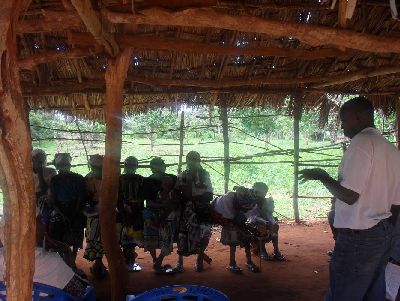
The women of both Mnarani and Matano Manne embraced this idea because they have these materials ready and they only need to put them to use, this also boosts them economically because once they are able to preserve food for a long time, then it means that they
can sell to others.
Matano Manne women listening to how to conserve
the environment even after using it
They are also able to find a market for their products if not then the organization assists in the marketing. The women are now healthy, owing to the fact that they are making herbal medicines.
World Oceans Day
Coast Women in development also participates in conservation and protection of the environment mostly the marine eco-system, this year it took part in organizing the World Ocean Day (WOD) which is an international holiday held on 8th of May annually.
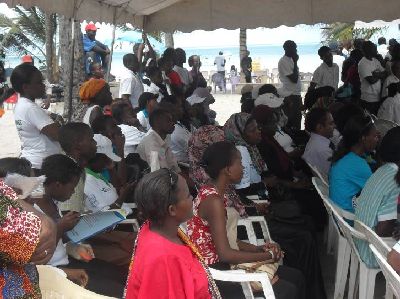
World Oceans Day at Jomo Kenyatta Beach.
WOD brings together various stakeholders of the ocean to learn about the Indian Ocean marine ecosystem as a crucial part of their surrounding environment. It sensitizes the public on the rights and obligations in accessing and protecting the ocean’s resources, teaches school children and youth about environment and the respective government policies and gives artisan fishermen the opportunity to coalesce and reflect on their resource base.
CWID was one of the stakeholders in the fundraising committee which was responsible for mobilizing resources from various sources for this important event.
Prevention Of Early Marriages Amongst School- Going Children
The Coast region of Kenya is prone to cases of young girls and boys being married off as early as 12 years. This leads to rapid early motherhood and most girls dropping out of schools and losing out on education. A case study is that of Kashani Primary School where seven girls have so far left school since the year began just because they have either fallen pregnant or are married off.
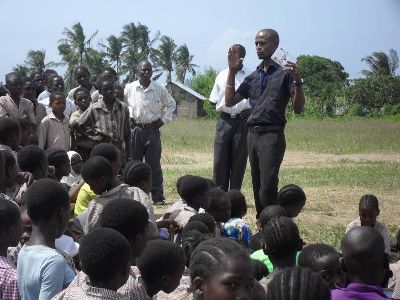
These girls are exposed to such incidences because their families are poor and cannot afford to sustain every family member satisfactorily, so they decide to marry off the young girls with the intentions of easening their burdens, some cultures also encourage these sad situations.
Pupils from Kashani Primary
school given a talk
on
repercussions of early marriage
Young girls and boys of Kashani Primary School were taken through the need to be in school and respect their peers but most of all take education seriously. These pupils were also adviced that there is no pleasure in early marriage instead one earns a lot of misery and shifting of responsibilitis to the younger generation.
CWID’S SUCCESS STORY
CWID is proud to share some of its success stories. These are stories that have directly affected the society and in one way or another, the organization has chipped in some assistance to push through the ordeal. One such incident is a case of one Fatma Mabrouk, a mother of five children who was left to care of them single-handedly yet she did not have a steady means of how she could take care of both her children and herself.
The organization assisted her in following this issue through to court and the children’s father is now assisting her to take responsibility of the children as well. In the new constitution both parents of a child, if alive, should contribute equally towards the upbringing of this child.